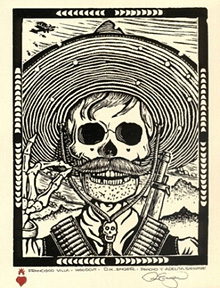
|  |  |  News Around the Republic of Mexico | September 2008 News Around the Republic of Mexico | September 2008  
Mexico in Turmoil on Eve of Independence Day
 Alison Raphael - OneWorld Alison Raphael - OneWorld
go to original


| | Most Mexicans have been affected by the crime surge, which includes kidnapping of wealthy individuals, drug- and gang-related street crime, and violence against women. | | |
Mexicans will celebrate the kickoff of their independence struggle this week, but the event may be overshadowed by the daily protests choking the turbulent country, some of which accuse the president of selling out Mexico's oil independence.

Mexico commemorates the beginning of its 10-year war of independence from Spain on Sep. 16, a day that normally brings an outpouring of nationalist sentiment and unified political discourse.

But relentless daily marches and demonstrations to protest violence, rising food prices, and plans by President Felipe Calderon to nationalize Mexico's petroleum industry are liable to heighten ongoing political disunity this year.

The recent outpouring of popular protest began in February 2007, when hundreds of thousands marched in Mexico City to protest the high price of corn and thus of tortillas - Mexico's equivalent of bread - which had risen by 400 percent.

Prices rose in part due to dwindling supplies as a result of the U.S. decision to cut back on corn exports in favor of using corn to produce ethanol.

The Mexico City protests have continued - numbering about 2,000 in 2007, involving some 9 million people - well into 2008. The city's official Web site now publishes a list of daily protests to help drivers avert traffic jams.

Late last month more than 100,000 Mexicans dressed in white and carrying candles converged on the historic downtown location known as the Zocalo (main square), to speak out against the insecurity caused by rampant violence and organized criminal networks throughout the country.

According to El Universal, a respected Mexican daily newspaper, organized crime is responsible for one crime every 85 minutes. Over 3,000 people have been killed since the beginning of the year, 19 of whom were decapitated. More had died violently by mid-June than in all of 2007.

Just this weekend, 24 dead bodies were found on the periphery of Mexico City, reportedly the victims of the drug wars.

Most Mexicans have been affected by the crime surge, which includes kidnapping of wealthy individuals, drug- and gang-related street crime, and violence against women.

In Ciudad Juarez, almost 300 women were killed over a 10-year period. Although public officials were found to have been negligent in investigating these murders, none have been brought to account, according to Amnesty International.

Calderon responded by launching a high-profile anti-crime initiative that sent soldiers and police into crime-ridden neighborhoods, but judging from the large numbers of Mexicans protesting recently throughout the country, the results so far have been negligible.

Another important source of anger in Mexico is Calderon's plan to sell off much of the nation's oil industry to private owners, possibly foreign owners, widely seen as a slap in the face to national pride.

Calderon argues that private ownership will lead to more investment in oil refining, and thus bring greater profits to Mexico in the long run, but few Mexicans seem convinced.

The country's unions, which backed Andres Manuel Lopez Obrador (Democratic Revolution Party) in Mexico's mid-2006 election, are determined that the government retain control over Pemex, the country's oil industry.

Lopez Obrador narrowly lost the election to Calderon, head of the more conservative National Action Party, and has since then complained bitterly of election fraud.

Two large-scale marches, one led by Lopez Obrador, were held Sunday and Monday to protest Calderon's plans for Mexican oil. The second protest was led by a civil society coalition, the National Movement for Food and Energy Sovereignty, Worker's Rights, and Democratic Liberties.

The marches brought together miners, electricians, transit workers, students, teachers, communications workers, neighborhood groups, and others, according to La Jornada, another Mexico City daily, reflecting "growing social dissatisfaction" and the "existence of a serious social and political crisis under Calderon."

Mexico City's "Grito de Independencia" - or "Cry of Independence" - will begin this evening in the Zocalo, replete with flags, indigenous dress, and vendors selling typical Mexican food, and is traditionally re-enacted by the sitting president.

Felipe Calderon may feel just a bit uncomfortable in this role as he contemplates selling the country's oil to foreign interests, just as many of those gathered at the Zocalo are liable to question his bona fides as a champion of Mexican independence. |

 |
|  |



